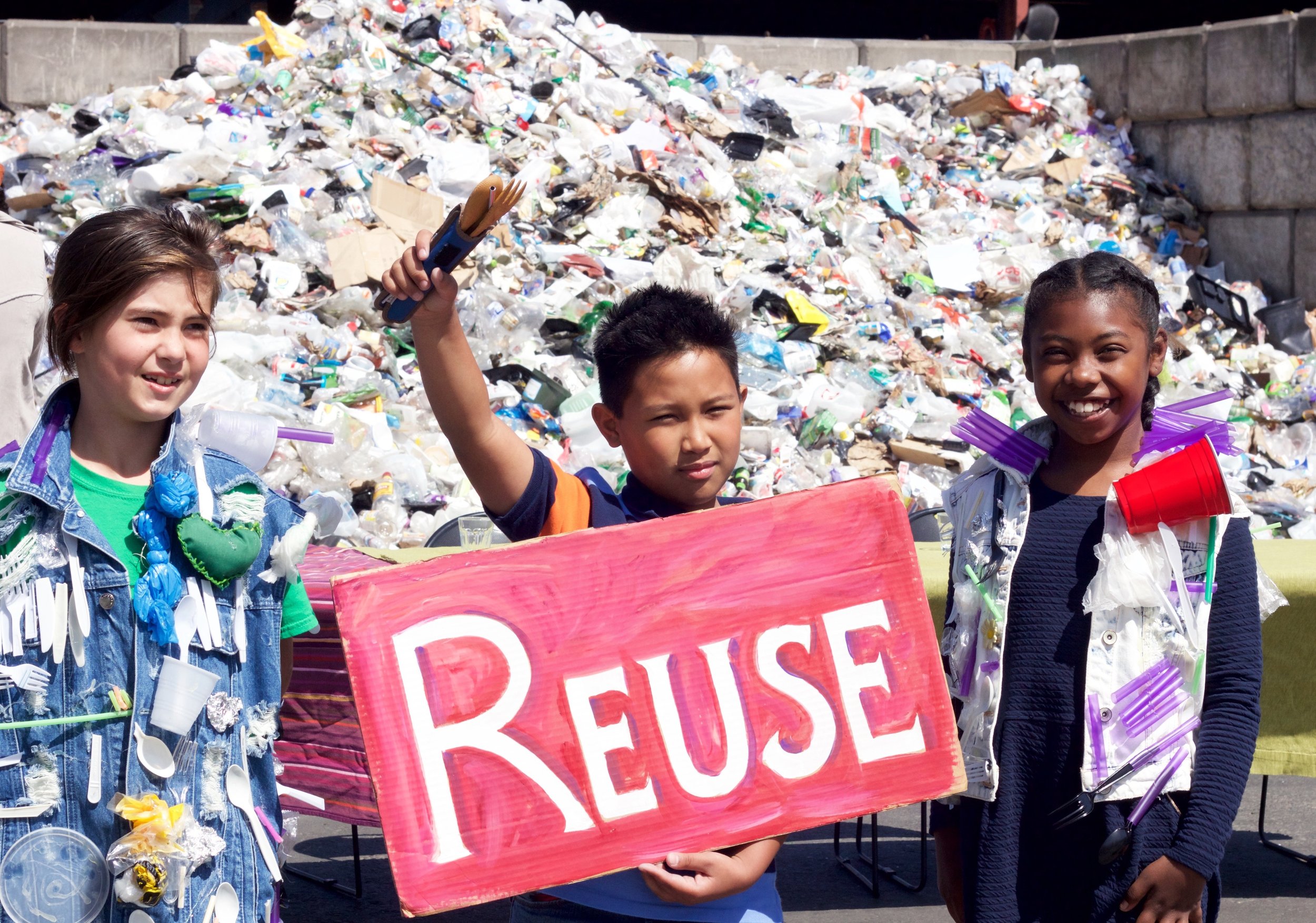Connecting with key stakeholders in your community to help pass reuse policy
Working with key stakeholders helps pull your community together around advocating for reuse.
Identifying who your key stakeholders are requires looking at the various problems that reuse can help to solve. Reuse is a solution for litter, climate change, economic justice and jobs. But reuse can present challenges for the disability community as well as low-income and unhoused populations that may not be able to afford deposits on reusables or charges for disposables, or may lack the ability to clean BYO reusables.
For each of these diverse constituencies, reuse advocates need to understand their priorities and find common ground. That means:
showing up at their meetings
connecting with the leading voices for each interest group
developing relationships that help you understand the synergies and sticking points your reuse initiatives have with their priorities
Engage the Business Community.
The business community is a primary stakeholder and perhaps the most important constituency to connect with locally.
Whether you are trying to get a policy enacted, or hoping to get food business operators to eliminate disposables voluntarily, connecting with the local business community is the first step to making change. Legislators, regulators, and local advocates need to engage with the local business community for a variety of reasons, such as:
creating meaningful relationships with the business community and showing them that no one wants to put them out of business;
learning about the challenges they face and ensuring reuse programs and policies are designed with these in mind;
identifying businesses that are already leaders in reuse that might be spokespeople and help convince their peers that reuse is doable; and
identifying those businesses that are interested in piloting reuse in their operations.
The first step in business engagement is to connect and learn. It’s important to understand the key issues that local business operators view as challenges in transitioning to reuse. Real challenges must be segregated from perceived challenges. Understanding the real challenges that businesses may experience in transitioning to reuse – such as labor shortages and water restrictions posed by drought – is important and must be incorporated into any program or policy.
Meanwhile, perceived challenges present opportunities for dialogue and education. A typical perceived challenge is the belief that reusable food service costs more and is hard to implement. Local governments and advocates can address these types of perceived challenges by hosting educational events to help business operators understand that moving to reuse can actually save them money, improve the customer experience, and provide opportunities to market themselves as sustainable businesses.
The best education comes from peer-to-peer learning. A pilot program that provides technical assistance with one or more local food service operators to implement the changes and document the impacts can be very useful in creating peer-to-peer learning opportunities.
A sample approach to making the right connections with local businesses
-
Surveys help you learn more about their operations, challenges with disposable and reusable products, and attitudes towards proposed changes. Examples:
-
Prepare to use them in the education and outreach to the local business community. ReThink Disposable provides great case studies to share and to help businesses identify ways to make simple switches from disposable to reusable.
It’s always best to have local business examples. If you don’t have any, consider conducting a pilot program locally. Or simply go out and find local businesses that have reusable food service on-site and in take-out. Document them by taking pictures of reuse in their operations and gather testimonials from the operators about why they chose reusables over disposables. Their views will resonate with others in the business community.
-
Reach out to the Chamber of Commerce, Business Improvement District, local restaurant association, and the economic development office or commission within city government – or any other group that foodservice businesses meet up with. Ask for meetings, or get on their agenda to do a presentation. Find out what their major concerns are regarding policies that require reusables in food service. Offer useful insight. Present information about:
Why Reuse Wins - how it benefits businesses
Findings from business outreach and surveys if they’ve been conducted.
Case studies from ReThink Disposable and the Reuse for Onsite Dining Library
For food businesses - the cost of disposable and how reuse saves money.
This business outreach guide provides more guidance.
-
As your group makes connections with food business operators, gather testimonials and signatures from businesses that support the idea of ditching disposables. It’s challenging to get businesses that support your ordinance to show up at hearings and testify - they are too busy. But a sign-on letter could be read into the record during public testimony at a hearing and sent to city council members during the public comment period on a proposed ordinance.
Here are some sample sign-on letters:
Engage environmental and economic justice leaders and impacted communities
In many urban areas, local environmental justice groups may see litter as a justice issue, as they tend to be the most impacted and receive the least local services – such as street cleaning and beautification and litter cleanup.
An effective engagement strategy is to host litter cleanup events in these neighborhoods that collect data on the quantity and composition of products. You will no doubt find that food and beverage packaging, as well as cigarette butts, are the most numerous littered items. Some cities have already conducted litter studies, but the studies may not compare neighborhoods based on socio-economic factors. Comparing litter in these neighborhoods to less impacted ones can provide greater insight for the elected officials that represent underserved portions of the community and thereby help to engage them as champions of policy solutions.
Other areas of synergy might come from neighborhoods adjacent to disposal facilities, such as landfills and waste incinerators. Groups seeking to reduce the harm posed by these polluting facilities on their communities can be great allies for turning off the tap - i.e. eliminating materials that enter the disposal operations.
Regarding economic justice leaders, it’s important to engage on the opportunities reuse can bring to boost a local economy. Specifically, reuse creates economic opportunities across the supply chain where local jobs are the priority and can be created and filled by those in the local community.
Connect reuse to climate change
Many environmental justice advocates see climate as a justice issue. Their community may be on the fence-line of oil and gas extraction, near plastics production facilities, or an area that is particularly vulnerable to sea level rise. Helping these communities to understand the climate benefits of reuse can help gain their support for reuse policies.
Reuse provides a mechanism for a Just Transition - which refers to building upon an economic and political power shift from an extractive economy to a regenerative economy, and approaches production and consumption cycles holistically and waste-free. In addition, reuse can be used as a greenhouse gas mitigation strategy, with reusables having smaller climate change impacts than their disposable counterparts.
Most cities have climate action plans, and most of them focus on reducing greenhouse gas emissions from transportation and the built environment. Some cities - C40 cities - recognize the connection between waste and climate change and have established the following goals:
Reducing the municipal solid waste generation per capita by at least 15% by 2030 compared to 2015; and
Reducing the amount of municipal solid waste disposed to landfill and incineration by at least 50% by 2030 compared to 2015, and increase the diversion rate away from landfill and incineration to at least 70% by 2030.
Even if your community has not adopted these goals, making the case for eliminating waste at the source to help your community achieve its climate goals can be an effective strategy. So, first, find out what your community’s goals are and connect with the organizers that are promoting them.
Engage youth voices
Students, teachers, and youth groups should never be overlooked as potential champions for the reuse cause. In many cases, it’s the kids who have made the biggest difference in policy advocacy as everyone is inspired by kids asking adults to create a better future for them. Ms. Omania’s class at the Hoover school in Berkeley were influential champions of the 2019 Reusable Foodware Ordinance - the first reusable foodware policy in North America.
Disability Groups
In some cities, the disability community has weighed in on plastic straws bans and cups charges ordinances. Plastic, because it’s flexible, is an easier material for many people with a disability to manage. Some plastic straw bans have made exceptions for people with disabilities, suggesting that food service operators keep some plastic straws on hand for accessibility issues. Since lightweight paper and plastic cups are easier to carry than heavier glass, ceramic, or metal, cups charge ordinances can provide exemptions for people with disabilities. Consulting representatives of the local disability communities can help you to craft policy exceptions or work-arounds that ensure that people with disabilities can access products and services impacted by a proposed policy.
The Roadmap to Reuse project was generously funded by the Ocean Protection Council.





